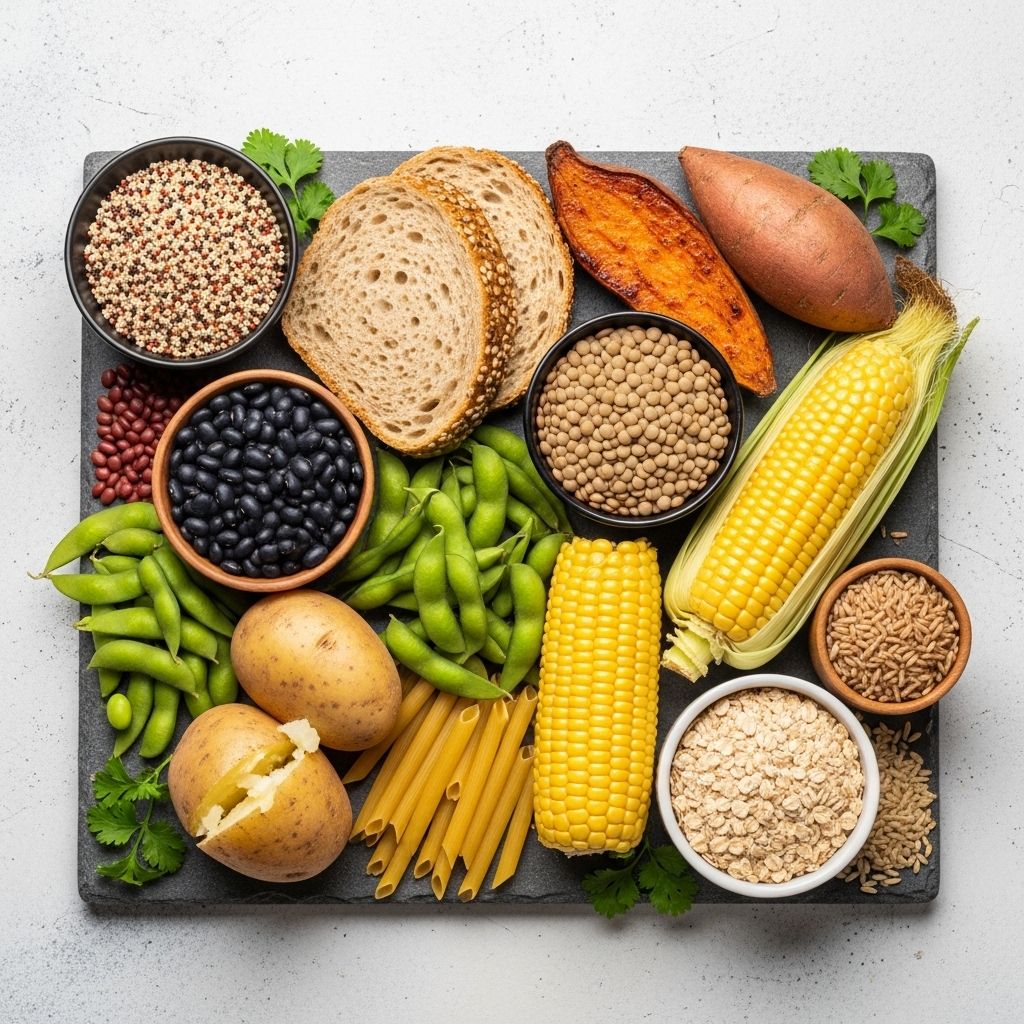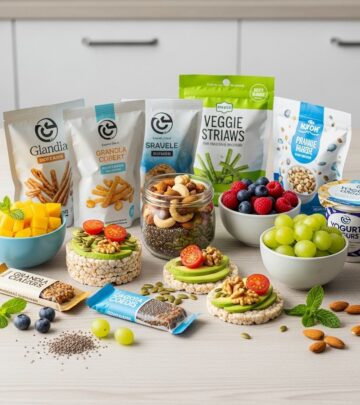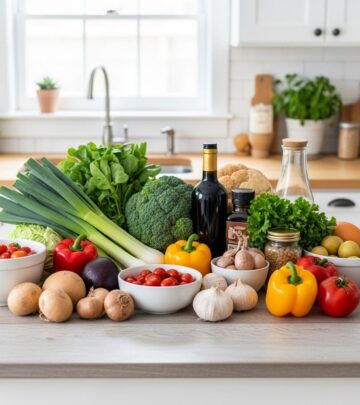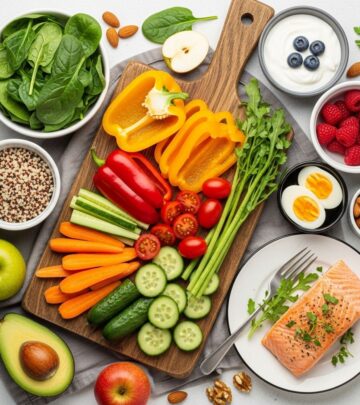11 High-Protein Carbs Nutritionists Recommend for Balanced Meals
Nutrient-rich grains and legumes deliver lasting energy and keep hunger at bay.

Deciding what to eat for optimal energy and wellness can sometimes feel overwhelming, but understanding your choices helps. Both carbohydrates and protein play vital roles in daily health, fueling everything from your muscles to your brain. Some foods naturally offer a smart combination of both, helping you balance nutrition, stay satisfied, and maximize energy throughout the day. Here is your comprehensive guide to high-protein carbohydrate foods, featuring expert advice and practical tips for every meal.
Understanding Macronutrients: The Power of Carbs and Protein
If you pay attention to nutrition, you’ve probably heard the term macronutrients (or macros)—these are nutrients your body needs in large amounts. Carbohydrates and protein are two of the three primary macronutrients. Each is essential for different reasons:
- Carbohydrates – Your body breaks these down into sugars, which serve as the primary energy source for muscles, organs, and the brain.
- Protein – Critical for building and repairing muscle, producing enzymes and hormones, and supporting overall cellular function.
Though protein and carbs are often discussed separately, combining them can deliver powerful benefits. Many healthy foods contain both protein and complex carbohydrates, making them smart choices for balanced energy and satiety.
Why Combine Carbohydrates and Protein?
Pairing carbohydrates with protein at meals and snacks is highly recommended by nutritionists. According to registered dietitian Heidi McIndoo, “Carbs give you an energy boost and deliver important nutrients, while protein helps you stay full longer. Together, they’re a smart combo for steady energy and lasting satisfaction.” Combining the two:
- Boosts and sustains energy throughout the day
- Promotes feelings of fullness and satisfaction
- Helps prevent energy crashes and unnecessary snacking
- Supports muscle growth, repair, and general health
How Much Carbs and Protein Do You Need?
Your personal needs vary with age, activity level, and lifestyle, but here are general guidelines:
- Carbohydrates: At least 130 grams per day for adults (according to the Dietary Guidelines for Americans)
- Protein: Approximately 0.8 grams per kilogram of body weight
Example: A person weighing 70 kg (about 154 lbs) should eat at least 56 grams of protein daily. For athletes or highly active individuals, protein needs may be higher.
Many online calculators and apps can help determine your specific macronutrient requirements based on your unique details and fitness goals.
What Makes a Carb ‘High-Protein’?
Carbohydrate-rich foods are traditionally considered separate from protein sources, but several foods bridge the gap — offering higher levels of protein while still being a good source of carbs. A ‘high-protein carb’ typically provides at least 3 grams of protein per serving and delivers substantial complex carbohydrates or dietary fiber. These foods help manage hunger, supply key nutrients, and maintain steady blood sugar.
Benefits of Choosing High-Protein Carbs
- Longer-lasting energy: Complex carbs digest more slowly, preventing rapid blood sugar spikes and dips.
- Satiety: Protein promotes a feeling of fullness, reducing cravings and unnecessary snacking.
- Muscle support: Protein is necessary for building and repairing muscle tissue, especially after physical activity.
- Nutrient density: Many high-protein carbs are also high in fiber, vitamins, and minerals that benefit your overall health.
- Support for fitness goals: Ideal for those looking to gain muscle, maintain weight, or manage appetite.
Expert Tips for Making Healthy Carb Choices
- Prioritize complex carbohydrates like whole grains, legumes, and starchy vegetables.
- Look for foods low in saturated fat and high in nutrients.
- Combine carb-rich foods with extra protein or healthy fat sources for balanced meals.
- Avoid highly processed, refined carbs with added sugars when possible.
The Top 11 High-Protein Carbohydrate Foods
Fill your grocery list with these nutritious, protein-rich carb sources suggested by leading dietitians—great for breakfast, lunch, dinner, or snacks.
| Food | Protein/Serving | Carbohydrate/Serving | Health Benefits |
|---|---|---|---|
| Quinoa | ~8g per cooked cup | ~39g per cooked cup | Complete protein; high in fiber, magnesium, and iron |
| Lentils | ~18g per cooked cup | ~40g per cooked cup | Rich in fiber, iron, folate; supports heart health |
| Chickpeas | ~15g per cooked cup | ~45g per cooked cup | Good for digestion; versatile for salads, soups, snacks |
| Whole Wheat Pasta | ~7g per cooked cup | ~37g per cooked cup | More fiber and protein than white pasta; filling |
| Edamame (Soybeans) | ~17g per cooked cup | ~14g per cooked cup | Complete protein; good plant-based source |
| Black Beans | ~15g per cooked cup | ~40g per cooked cup | Fiber-rich; benefits gut health |
| Green Peas | ~8g per cooked cup | ~25g per cooked cup | Packed with plant protein; vitamin C and A |
| Kamut (Ancient Grain) | ~11g per cooked cup | ~60g per cooked cup | Unique flavor; higher protein than most grains |
| Farro | ~6g per cooked cup | ~37g per cooked cup | Ancient grain; rich in fiber and B vitamins |
| Barley | ~4g per cooked cup | ~44g per cooked cup | Great for soups and salads; high in soluble fiber |
| Oats | ~6g per cooked cup | ~28g per cooked cup | Contains beta-glucan fiber; supports heart health |
Nutritionist Tips for Adding High-Protein Carbs to Your Routine
- Breakfast: Top oatmeal with a spoonful of Greek yogurt or nut butter for extra protein.
- Lunch: Build salads around quinoa, farro, or beans to keep you full for hours.
- Dinner: Swap white rice for barley or brown rice mixed with lentils. Add beans to soups and chili for a hearty boost.
- Snacks: Try roasted chickpeas, edamame, or whole grain crackers with hummus.
Complex Carbs vs. Simple Carbs: What’s the Difference?
Carbohydrates tend to be classified as simple or complex:
- Simple Carbohydrates: Often found in processed foods (such as white bread and pastries) and sugar-sweetened drinks. These are digested quickly—leading to rapid energy spikes and crashes.
- Complex Carbohydrates: Found abundantly in whole grains, legumes, vegetables, and fruit. They digest more slowly and provide a steadier energy source. Typically, they are richer in nutrients and fiber, making them superior choices for most meals.
For optimal nutrition and lasting energy, focus on complex, unprocessed carbs that naturally contain protein and fiber.
Frequently Asked Questions (FAQs)
Q: Are high-protein carbohydrates suitable for weight loss?
A: Yes. High-protein carbs are filling and supply both energy and protein, supporting satiety and reducing overall calorie intake. Combining protein with complex carbs also helps prevent blood sugar spikes that can trigger cravings.
Q: How do high-protein carbs compare to meat in terms of protein?
A: While most high-protein carbs contain less protein per serving compared to meat or poultry, they make valuable contributions to your daily intake—especially when combined throughout the day. Incorporating both plant and animal proteins (if you aren’t vegetarian) adds variety and balances your nutrient profile.
Q: What’s an easy swap to add more high-protein carbs to my diet?
A: Replace white rice with quinoa, cook whole grain pasta instead of regular, and add beans or chickpeas to salads and soups. These simple changes boost both your protein and fiber with minimal effort.
Q: Are high-protein carbs good for athletes?
A: Absolutely. Athletes benefit from the energy and muscle support these foods offer. They also help with workout recovery and are ideal for those training for endurance or strength events.
Q: Can kids benefit from high-protein carbs?
A: Yes. High-protein carbs are packed with essential vitamins and minerals that support growth and brain health, making them excellent for children’s meals and snacks.
Key Takeaways for Smart Grocery Shopping
- Read nutrition labels and aim for higher fiber and protein content.
- Favor minimally processed, whole food sources with simple, recognizable ingredients.
- Look for words like “whole grain,” “sprouted,” or “ancient grain” to boost nutrition.
- Incorporate a variety of high-protein carb sources for flavor and health benefits.
Sample Day of Meals Featuring High-Protein Carbs
- Breakfast: Oatmeal topped with chia seeds, blueberries, and a dollop of almond butter.
- Mid-Morning Snack: Roasted edamame or a trail mix with whole-grain cereal and nuts.
- Lunch: Quinoa salad with chickpeas, spinach, bell pepper, and feta cheese.
- Afternoon Snack: Whole-grain crackers with hummus or black bean dip.
- Dinner: Lentil and barley stew with roasted root vegetables.
Conclusion: Making High-Protein Carbs a Daily Habit
Choosing high-protein carbohydrate foods is a delicious and effective way to upgrade your nutrition. By emphasizing whole grains, legumes, beans, and ancient grains, you can enjoy meals that are not only satisfying but also support your long-term health. Whether you’re aiming to build muscle, maintain energy, or simply eat well, these high-protein carbs make every meal count.
References
Read full bio of Sneha Tete












